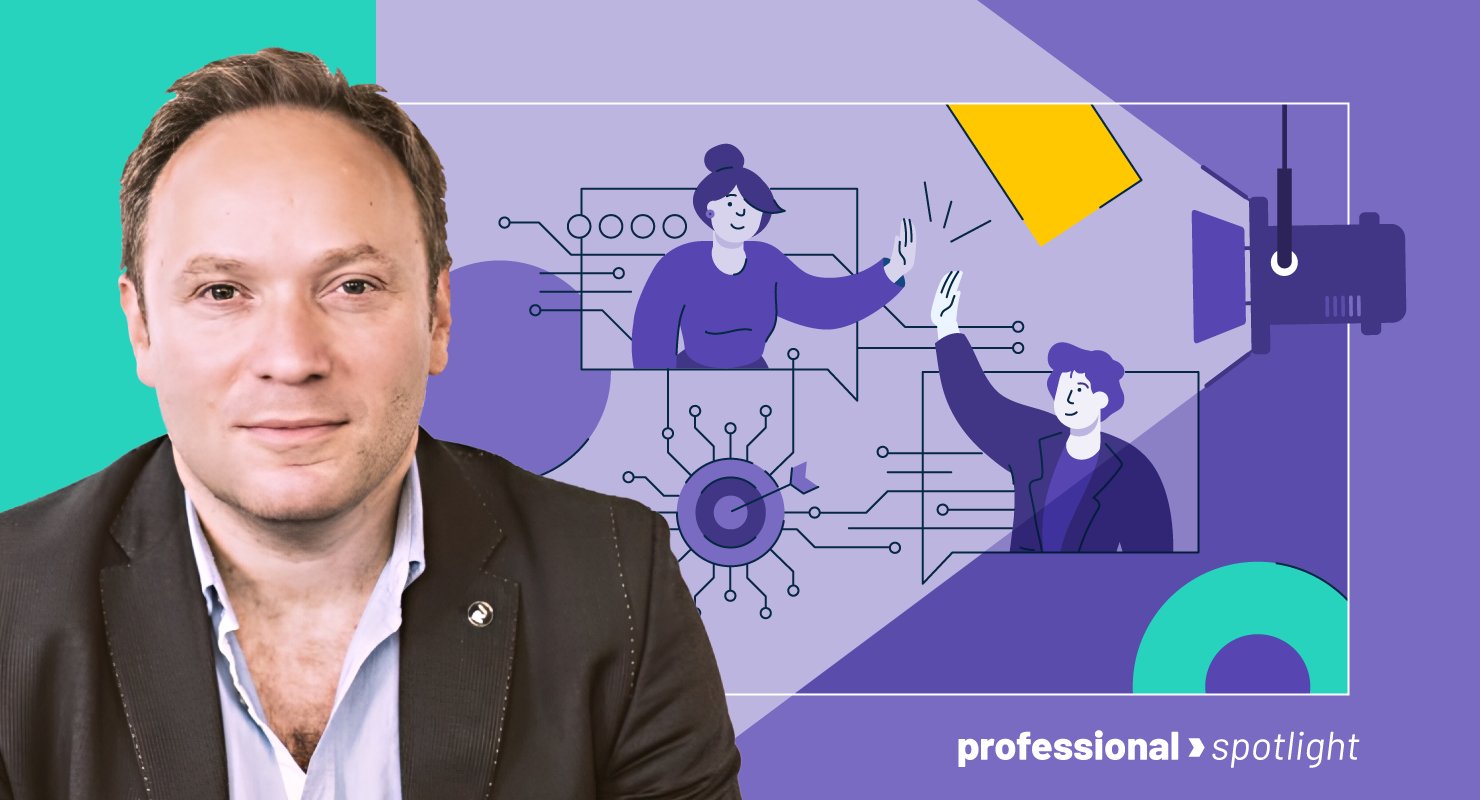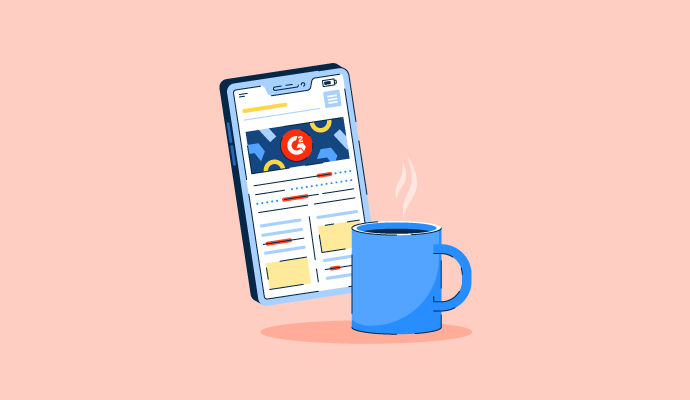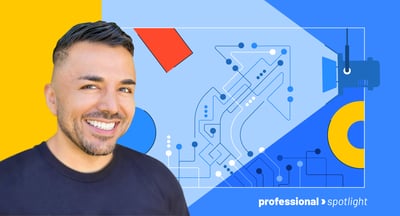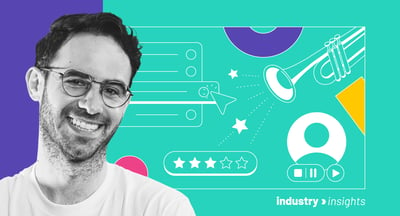November 1, 2023
 by Alexandra Vazquez / November 1, 2023
by Alexandra Vazquez / November 1, 2023

A prospective buyer sifts through a bunch of software options, hesitating, evaluating, and most importantly, questioning the credibility of each option.
How does a business successfully navigate the terrain of this buyer’s journey to guarantee that this person not only chooses but stays loyal to them? As businesses work to entice and keep their customers, the art of cultivating trust continues to show up as the major factor that can make or break success.
I interviewed RELAYTO CEO and co-founder, Alex Shevelenko, to discuss how companies like his are harvesting trust with potential buyers and which strategies he and his team are implementing to keep that trust over the course of time.
To watch the full interview, check out the video below:
This interview is part of G2’s Professional Spotlight series. For more content like this, subscribe to G2 Tea, a newsletter with SaaS-y news and entertainment.
What’s your favorite beverage? I have coffee in my blood. I think coffee is a symbol of energy. And I want to bring energy to work.
What was your first job? I worked for the Washington Department of Roads and cleaned garbage from the highways and the freeways. It really is beautiful to remember the humble beginnings. It was something that made me really aware of responsibility. We have to take care of each other and the beautiful world we live in.
What are some of your best time management hacks? Well, I love audiobooks. I was a voracious reader and wanted to consume all the important ideas, and never had enough time, so I eventually just moved to that.
What’s your favorite software in your current tech stack? I don't want to sound self-serving, but I genuinely love what we're building at RELAYTO. I personally use it more than anything else.
What problems or issues at work make you want to throw your laptop out the window? I think there was an accident one time where my laptop fell, and it was a very unproductive few days after that. I would never throw my laptop just to be very transparent in that. I'm really focused on developing more attributes of a stoic leader who is able to be aware of that emotion and then channel that into something that's healthy.
Alexandra Vazquez: You’ve mentioned that you co-founded RELAYTO to “abolish static, pre-internet, and pre-mobile content on screens.” What were some limitations or challenges that you encountered that made you come to that conclusion? How do you continue to carry out that mission?
Alex Shevelenko: Humans have an advantage over other species where one of our strengths is that we can communicate at scale.
For example, a conventional document in the physical world has this low energy. If we're paying money to promote a message, and it looks like that, it doesn't help, and it doesn't really do anything because people won’t engage with us.
So our idea is very simple, like the most important ideas still tend to be: substantive presentations and documents. It’s like good calories for our minds. And we want nutrition, right? It needs to taste good. It needs to align with our goals, our image, and what we want to consume. People will trust the things that are humanized, but have evidence behind them.
How do you ensure that trust-building strategies are seamless and coherent across different stages of the buying process?
It's essential to engage your customers and make sure they're successful across the journey. What we see our most successful customers do is that they actually stop thinking in silos. If you hear the terminology, there's a sales tech stack, there’s a marketing stack, and then there is a customer success stack. They don't talk to each other because they use different stacks.
If you give a designer, a marketer, and a sales rep the same way to connect, they could provide a data-driven design, so they could get feedback on whatever they've created and actually see if it's working. The very front of the customer has a high-end design production value and is being used in marketing. It could be relevant to a new customer who is just ramping up. The modern customer wants to engage, especially in B2B businesses.
How do you encourage and manage customer feedback to enhance credibility?
We love G2 exactly for this reason: we want to hear from our customers. We encourage our customers to give us feedback, especially when they're really engaged with the product deeply. With new customers, getting feedback from them is also helpful. It allows us to think broadly, like, “How do we simplify and create a more product-driven process versus a sales-driven process?” So that feedback is essential.

Marketing news brewed fresh every week just for you. Subscribe here
We personally think our success depends on people using it across a range of use cases. It also allows us to be more transparent with our customers. I think this goes back to the question of trust, right? Who do you trust more? Do you trust the vendor that says “We're just absolutely the best! Trust us!”?
There's a way to create customer interactions through scalable channels, or more personal channels. What's important is once you have these reviews and reports, how do you make people consume them? This is where we can help people build that trust.
So, like plugging your G2 widgets into a RELAYTO pitch and plugging in the report to make it engaging so people can consume it, how do we provide something that G2 does and make that live in other places where the reviews could be shared outside of a regular sales process?
How does your company strike a balance between automated interactions like AI and chatbots and maintaining a human touch?
When people talk about artificial intelligence (AI), there are different types of AI. You can mention chatbots, and then there's what we call a set of AI and algorithmic approaches to what we do with content transformation.
We use AI for a number of proven data-driven ways in which you could take a static asset or conventional asset and use AI to make it perform 100 times better. But what's really important is we allow the creator to control whether they use it, where they turn it on, turn it off, and that's the superpower. AI is not a replacement.
I spoke to Godard Abel about Monty, I think we're brothers from another mother there. We have developed a chatbot in a box that basically takes thousands of pages, and hundreds of documents, and allows you to read through them using AI to get that one nugget on that one specific page immediately.
The cool part for us is that a customer doesn't need to do anything. They don't need to know whether that's OpenAI or another API. They know that it's a safe solution to plug in their content, and the chatbot works without losing the context, without losing the substance, and without losing the ability to validate and check.
If AI gives you an answer, but doesn't provide a page or pages from which that answer came, you could be making a huge mistake. We believe that people still need the power to validate and contextualize the answers. That is the vision that we have for consumable AI.
What are some future initiatives or innovations you see that will further enhance trust in the buying cycle?
I think the number one trend that we see right now is that people are using platforms and engaging more and more with, let's say, an ebook, to really drill in and understand the point of view of the author of a whitepaper. I think, historically, we've had this view that we're gonna write some spammy blog, and if we do enough of that, we're going to drive traffic and that traffic is gonna succeed in conversion. I think Google is not going to allow that in the world of AI that is being commoditized.
People are just going to be in an ocean of information, but they'll still be thirsty for authentic interactive experiences. We believe the future is interactive.
Imagine we were able to have this conversation, where you're looking through and double-clicking in certain areas and exploring other questions that interest you. That's what we see happening in the world. I think the more you can create digital interactions that feel human versus churning out more spammy content that feels like a machine talking to another machine, that's where humans are gonna thrive.
The value and expectations of human interactions are much higher now, and they need to be supported with digital tools. 95% of the buyer journey is going to be happening without human touch points.
The real fundamental question that we need to ask ourselves as an industry and as a society is, “Can we humanize these interactions? Can we do something that makes us excited about our work?”
Check out our full conversation on YouTube.
Follow Alex Shevelenko on Linkedin to learn more about his content experience platform, RELAYTO, and his thoughts on the buyer’s journey as an entrepreneur.
Alexandra Vazquez is a former Senior Content Marketing Specialist at G2. She received her Business Administration degree from Florida International University and is a published playwright. Alexandra's expertise lies in copywriting for the G2 Tea newsletter, interviewing experts in the Industry Insights blog and video series, and leading our internal thought leadership blog series, G2 Voices. In her spare time, she enjoys collecting board games, playing karaoke, and watching trashy reality TV.
Startups are more than their outward success. Behind the glossy exterior, every day, the...
 by Harshita Tewari
by Harshita Tewari
Ask most sales representatives what makes a company successful. You'll get as many answers as...
.jpg) by Nick Telson-Sillett
by Nick Telson-Sillett
Startups are more than their outward success. Behind the glossy exterior, every day, the...
 by Harshita Tewari
by Harshita Tewari
Ask most sales representatives what makes a company successful. You'll get as many answers as...
.jpg) by Nick Telson-Sillett
by Nick Telson-Sillett



